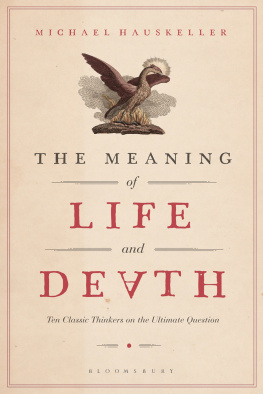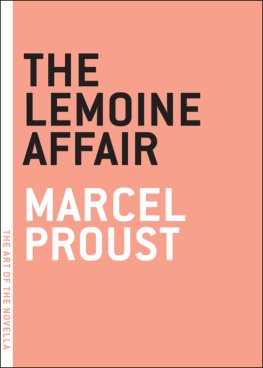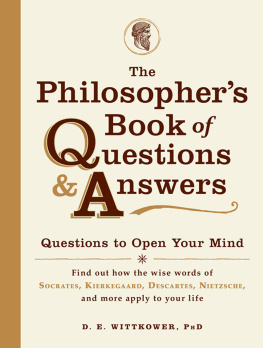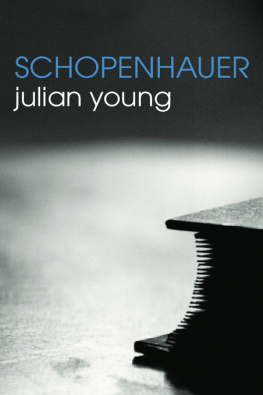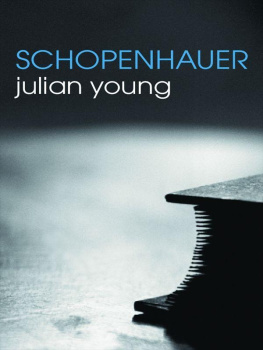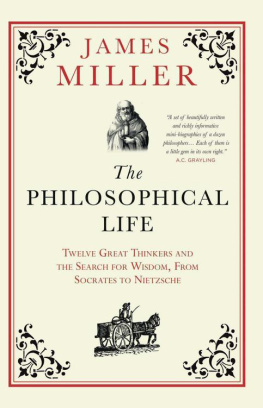The Meaning of Life and Death
Also Available at Bloomsbury
The Philosophy of Death Reader: Cross-Cultural Readings on Immortality and the Afterlife, edited by Markar Melkonian
Enduring Time , Lisa Baraitser
Dedicated to the memory of my father, Erich Arthur Hauskeller
(190574)
The Meaning of Life and Death
Ten Classic Thinkers on the Ultimate Question
MICHAEL HAUSKELLER

Contents
None of the material used in this book has been published previously. However, drafts of individual chapters have been read and commented on by a great number of people. I am immensely grateful to all of them, but I would like to thank in particular those colleagues and friends whose continued interest and support has made me feel that when I was writing this book I was doing something that mattered, something meaningful: Drew Chastain, Lewis Coyne, Nikos Gkogkas, Simon Hailwood, Peter Herrisone-Kelly, Daniel Hill, Kyle McNease, Jelson Oliveira and Yiota Vassilopoulou. This book is for you.
What is the point of living? If we are all going to die anyway, if nothing will remain of whatever we achieve in this life, why should we bother trying to achieve anything in the first place? Why does it matter what we do or not do? Or does it? Can we be mortal and still live a meaningful life? Questions such as these are not new. They have been asked for a long time. They are part of, or versions of, what is sometimes called the ultimate question. The ultimate question concerns the meaning of life and death and is ultimate not only in the sense that it is the most fundamental question, reaching down to the very core of our existence, but also in the sense that it is the most difficult one to answer.
In Douglas Adamss Hitchhikers Guide to the Universe , it takes the supercomputer Deep Thought several million years of calculations to come up with an answer to the ultimate question of life, the universe and everything. That answer is, as many readers will know, 42. That is of course not much of an answer because it doesnt really tell us anything. If we had received no answer at all, that would have been just as instructive as this one. In the series, the cryptic nature of the answer is explained by the fact that those who programmed the computer had no clue what the question was that it was supposed to answer, and the vagueness and uncertainty of the question is indeed part of the problem. The ultimate question of life, the universe and everything is, after all, not really a question at all. So what exactly is it that we want to know when we raise that question? Depending on what we are asking, the answer may not always be the same. And clearly there are questions to which 42 is a perfectly reasonable and indeed the correct answer, for instance, How much is six times seven? except that it probably wouldnt occur to anyone that this might actually be the ultimate question of life. So what is it then?
One way of understanding the question is in terms of purpose . We can look at life, the universe and everything, and ask what all this is actually good for, what purpose it serves. When I recently asked my son Arthur (who is now ten years old and annoyingly smart), what he thought the meaning of life was, he did not have to think about it at all. Instead, he answered my question right away, without hesitation and with great confidence, as if he had already concluded his own personal calculations and then come up with the right answer (very much like Deep Thought, except much faster): The meaning of life, Dad, he said, is death. When I asked why, he replied, Because everything dies in the end. And then he added, But the meaning of death, Dad, is life, because there could be no life without death.
This really happened. (Did I mention he is a smart kid?) Needless to say, I was quite impressed. But then again, it was not quite the answer I was looking for. His answer may have been right, but it is still wrong because what it answers is not really the question I meant to ask when I asked him about the meaning of life. Let me explain: the meaning of life is indeed death if we understand meaning as the natural endpoint of an event or process. As far as we know, all life ends in death. Not only we as individuals and everything else that lives will die one day, some sooner, some later, but also life itself (or at least life on earth) will one day come to an end even if that end may still lie millions of years in the future. But my sons answer actually suggested more than just that. There is an idea of purpose here, introduced in the second part of his response: if not only life but also death has a meaning, and if the meaning of death is life, then meaning must mean more than just where something is headed. Death, after all, does not naturally end in life. There is, however, good reason to think that death is necessary for new life to arise. Not only do we all live off the death of others (the plants and animals we have to consume to be able to continue living); it is also difficult to see how there could ever be new life if the things that already are alive did not die at some stage. So perhaps that is why they die. Living beings would then come to an end to make room for new living beings. We may then answer the question Why do we have to die? by saying that we have to die so that others can live. This would then be the purpose of our death, that which our death is good for. And if the meaning of death is life in that sense, then we must see death as the meaning of life in the same sense, namely, in the sense that we live in order to die, that the purpose of our living is our dying.
However, even if that were true, and even if we believed it was, it would still not provide us with a satisfactory answer to that elusive ultimate question about life. If we live in order to die, and die so that more like us can live, what then is that whole cycle of living and dying, and living and dying again, good for? If life leads to death, and death leads to life, where does that lead? What is all this living and dying about? We may now know why we live and also know why we die, but we still dont know why we live and die.
Yet even if we found an explanation for all of this, an explanation for why there are living and dying things in the first place, it would still not give us the answer we seek. No purpose that we can think of can do that, no matter how big and all-encompassing it is. If I am told that x happens for the sake of y, and y happens for the sake of z, then I can still, independent of what z is, wonder what that is good for. If everything serves, say, the glory of God, then what end does that glory serve? And once we start considering not only life, but the whole universe and everything, wondering what its end or purpose is (Why is there something rather than nothing?), then the question is hardly intelligible anymore because we seem to be asking for something that simply cannot exist, namely, something that is somehow more than, or outside of, everything.
Clearly, questions about purpose (What is it good for?) can only ever lead us so far. Whatever purpose we may come up with, it is always possible for us to ask what the point of that purpose is, and to be told that we live and die for the glory of God or in order to make the universe more colourful and varied, or whatever other purpose you may want to suggest here, is not necessarily more satisfactory than if we were told the purpose is 42. The problem is that we find it difficult to look at life and death, or at any rate our own life and death and (for most of us) the life and death of our loved ones, as just another fact in the world, a fact like any other. Death certainly is widely regarded as more than that: it is morally objectionable, something that ought not to be and yet is. So when we ask about the meaning of death we dont really want to know what death is good for. We are looking not for an explanation but for a justification . And since it is hardly possible for us to think of life and not also think of death, because we are well aware that there is no (or at least has never been so far) life without death, when we ask about the meaning of life we also want more than just an explanation in terms of an efficient or final cause of its existence. How it is possible that at some stage in the history of Earth life emerged from inanimate matter is an interesting scientific question, but answering it would not answer our ultimate question. Whether life has some purpose other than itself is also an interesting question, but answering it would not answer the ultimate question either, unless that purpose is so clearly worth all that was needed to realize it that the follow-up question And what is that good for? simply no longer arises. In other words, we would need something that is not good for anything but itself (which means that it is not good for anything, but still undoubtedly good ). Only such an intrinsic purpose (a means that is its own end) could conceivably allay or diffuse the moral scandal of our mortal lives. It would be something that helps us make sense of it all.

